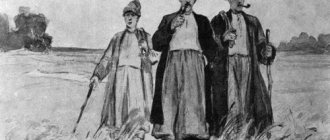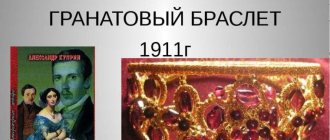Article menu:
- Characteristics
- Criticism
- Catchphrases from the story
- Test on the plot of the story
- Key:
Karamzin’s incredibly sincere and emotional work does not leave anyone indifferent - in the story the author described the typical feelings of people in love, outlining a picture from the very beginning to the decline of the feelings of one of the lovers.
The philosophical subtext and psychological basis make this work look like a legend - a sad tale based on real events.
Characteristics
Karamzin's story does not have a significant list of heroes. There are only five of them:
- Lisa;
- Lisa's mother;
- Erast;
- Annushka;
- Author.
The image of Lisa is depicted in the best traditions of sentimentalism - she is a sweet and sincere girl, gentle and impressionable: “pure. a joyful soul shone in her eyes.”
The girl is somewhat similar to an angel - she is too innocent and virtuous: “beautiful in soul and body.” It seems that she grew up in another world, because she was able, despite all the difficulties of society and the era, to preserve goodness and humanity.
At the age of 15, Lisa was left without a father. Life with her mother was difficult financially, but easy in the psychological aspect - a friendly, trusting relationship was established between mother and daughter. The mother, being a compassionate woman, constantly worries about her beloved daughter, like all parents, she wishes her a better fate. The woman could not survive the loss of her daughter - the news of Lisa’s death became fatal for her.
Dear readers! We invite you to analyze the story “Poor Liza,” authored by N. Karamzin.
Erast is a nobleman by birth. He is an intelligent and educated person. His life is typical for a young man of his age and class - dinner parties, balls, card games, theater, but this does not bring him much joy - he is quite tired of all the entertainment. Meeting Lisa noticeably changes him and, instead of boredom, he develops an aversion to the trappings of social life.
Lisa’s harmonious life allowed him to consider other aspects of existence: “with disgust he thought about the contemptuous voluptuousness that his feelings had previously reveled in.” The image of Erast is not without positive qualities - he is a gentle and courteous person, however, the selfish spoiledness of the young man did not allow him to become as harmonious as Lisa.
We invite you to familiarize yourself with the summary of the story “Poor Liza,” which came from the pen of the classic author N. Karamzin.
The image of Annushka in the story is fragmentary - we meet this character already at the end of the work: having learned about Erast's wedding, Lisa realizes that she cannot come to terms with it and does not understand her life without this person - the option of committing suicide seems to her one of the most acceptable. At this time, Lisa notices Annushka, the neighbor’s daughter, and instructs her to give the money to her mother. After this, Lisa throws herself into the pond.
The image of the author in the story is one of the key ones - this character “personally knew Erast” and therefore can tell in detail about the tragic story in the life of the young man and his beloved.
Criticism
Karamzin's story was repeatedly called a breakthrough of its time; the motif, so typical of European literature, was for the first time transferred to the plane of Russian culture, which was already an innovation. The public's particular interest in the work was also caused by the introduction of a new direction - sentimentalism.
Literary critics and researchers highly appreciated Karamzin’s story and noted that the author managed to recreate “living” reality for the reader - the work was surprisingly realistic, devoid of artificial emotions and images.
Russian scientist, professor-philologist V.V. Sipovsky believed that Karamzin was the “Russian” Goethe - his living word contributed to a breakthrough in literature.
Karamzin, according to the scientist, provided readers with the other side of the coin, showing that a person’s life, even if he is just an invention of the author, should not always be filled with idyll, sometimes it can have fatality and tragedy: “The Russian public, accustomed in old novels to comforting endings in the form of weddings, who believed that virtue is always rewarded and vice is punished, for the first time in this story she encountered the bitter truth of life.”
A. Bestuzhev-Marlinsky, analyzing the significance of “Poor Liza,” focused on the European basis of the story, both in terms of plot and in terms of sentimentalism, which had not yet spread to Russia, but was already widespread in Europe. “Everyone sighed until they fainted” - this is how he assesses the influence on the public of the work, and quite ironically notes that after the release of “Poor Lisa” everyone began to “drown in a puddle.”
G. A. Gukovsky also speaks about the same effect, noting that after reading “Poor Liza,” crowds of young people began to appear near the Simonov Monastery and admire the surface of the lake, in which, according to Karamzin’s idea, the girl drowned.
In his opinion, nature in the story performs its own special function - it tunes the reader to a lyrical perception of reality. Poor Liza is not so much a real peasant woman as an ideal opera heroine, and her sad story should not outrage, but only create a lyrical mood.”
V.N. Toporov argues that “Poor Liza” became a significant work not only in Russian literature, but also in the work of Karamzin - it was this work that opened the era of “breakthrough” both in the work of the literary figure and in the historical development of literature in general.
“Poor Liza” is precisely the root from which the tree of Russian classical prose has grown, whose powerful crown sometimes hides the trunk and distracts from reflection on the historically very recent origins of the very phenomenon of Russian literature of the modern era.”
Catchphrases from the story
I love those objects that touch my heart and make me shed tears of tender sorrow!
Every person is sentimental to one degree or another. Some people show their sentimentalism from an early age, while others acquire this feeling after some time, having acquired sufficient life experience.
The special emotions that arise in a person during contact with objects of material or spiritual culture help create the effect of catharsis - emotional relief.
Peasant women know how to love!
Until a certain point, it was believed that peasants were not emotionally and mentally similar to aristocrats. The essence of this statement was not the lack of education of the peasants, but the conviction that the peasants, even with education, would not be able to become similar in spiritual development to representatives of the aristocracy - they were not characterized by high manifestations of feelings, in fact, it turned out, based on this theory, that the peasants were guided exclusively instincts, they are characterized only by the simplest emotions. Karamzin showed that this is not so. Serfs can show different feelings and emotions, and theories that they are several steps lower in their development are prejudices.
It is better to feed yourself by your own labors and not take anything for nothing.
This phrase reflects the moral principles of an honest person - if you haven’t earned money for a certain thing, then you have no right to claim it.
Old people can be suspicious
Due to their age and life experience, old people try to protect young people from the mistakes of their youth. Since young people are often in no hurry to share their problems and concerns with the older generation, the only way to find out about the upcoming problem is to analyze the individual’s behavior, and for this you need to be observant.
How good everything is with the Lord God! It is necessary that the Heavenly King should love a person very much when he removed the local light so well for him.
In the natural world, everything is harmonious and aesthetically pleasing. A person with a sensual soul cannot help but notice these subtleties and admire them. In spring and summer, the feeling of the beauty of nature is felt especially vividly - nature, which had fallen asleep in winter, comes back to life and delights the surrounding world with its charm. Creatures who have the opportunity to contemplate all this beauty cannot be unloved by God, otherwise he would not try to create such a beautiful and harmonious world.
The fulfillment of all desires is the most dangerous temptation of love.
There is always love fervor between lovers, however, in the case when relationships between people develop too quickly and the effect of permissiveness is present, the fervor quickly fades away - when everything has been achieved, then there is not a single nook left in a person’s soul where a dream or desire to penetrate fantasy - there is no reason for dreams, if in this case the relationship does not reach another level (for example, marriage), then there is a fading of emotions and passion in relation to the object of one’s passion and admiration.
Death for the fatherland is not scary
A person is unthinkable without his “roots”; one way or another, each individual must recognize himself not only as a part of society, but also as a part of the state. The welfare and problems of the state should be perceived by everyone as the problems of their own family, therefore death in the name of one’s state is not inglorious.
Test on the plot of the story
1. How old was Lisa when her father died? A) 19 B) 15 C) 10
2. Why, after the death of the father, did the family begin to live in poverty? A) could not pay rent for the land B) the workers did not cultivate the land so well and the harvest decreased C) the money was spent on the treatment of sister Lisa
3. At what price did Lisa sell lilies of the valley? A) 5 kopecks B) 5 rubles C) 13 kopecks
4. Why didn’t Lisa start selling flowers for 1 ruble? A) It was too cheap B) her conscience did not allow her C) The ruble was spoiled
5. Why do Lisa and Erast meet at night? A) Erast is busy all day B) They may be slandered C) Their meetings may cause a quarrel with Erast’s fiancee
6. Why was Lisa afraid of a thunderstorm during one of their night meetings with Erast? A) She was afraid that the thunder would strike her like a criminal. B) Lisa was always afraid of thunderstorms. C) The thunderstorm was very strong and the girl was afraid that her mother would wake up and find that Lisa was not at home.
7. Why didn’t Erast refuse to go to war? A) could not contradict the order B) Lisa became disgusting to him C) everyone would laugh at him and consider him a coward
8. Why is Erast not afraid to die in war? A) He knows no fear B) death for the Fatherland is not scary C) he has been dreaming of death for a long time
9. Why did Erast order Lisa to forget him? A) he was tired of the girl B) he was afraid that everyone would laugh at him if they found out about his relationship with Lisa C) he was engaged and a relationship with Lisa could harm his marriage.
10. What did Lisa do with the money that Erast gave her? A) gave it back to Erast B) gave it to the beggar standing under the church C) gave it to the neighbor’s daughter so that she would give it to Liza’s mother.
11. How did Lisa’s mother perceive her death? A) Killed Erast B) Drowned herself from grief C) The news was so stunning for her that she died immediately
12. What do the peasants think when they hear the howling of the wind in the house where Lisa and her mother lived? A) it’s Lisa’s soul crying B) the tramps have climbed into the house for the night C) It’s Erast who comes to grieve for his lost happiness.
LiveInternetLiveInternet
—Categories
- Art gallery (4494)
- Reading and Art/book (543)
- Children's images in painting (370)
- Poetry (2263)
- Russian poets/Soviet poets (400)
- Anthology of octets (101)
- Vladimir Vladimirovich Mayakovsky (88)
- Translations (78)
- Anthology of octets/Supplements (75)
- Anthology of one poem (66)
- Francesco Petrarca (49)
- Biblical motifs in Russian poetry (29)
- Anthology of poetry from Russian diaspora 1920–1990 (19)
- Osip Emilievich MANDELSHTAM love lyrics (18)
- Poets of the "Golden Age" (14)
- A. Akhmatova. Poems about love (11)
- Nikolai Alekseevich NEKRASOV Poems about love (6)
- MARSHAK SAMUIL YAKOVLEVICH (47)
- Poets and poetry of the Silver Age (281)
- Actors read classics/poetry (312)
- Essence of the Day (1943)
- Writers - poets - life and fate (992)
- A.P. Chekhov (123)
- VLADIMIR GILYAROVSKY IS A DISTANT RELATIVE OF ERAST (6)
- Leo Tolstoy (685)
- Leo Tolstoy On truth, life and behavior (377)
- Thoughts of wise people for every day (84)
- Tolstoy Lev Nikolaevich Diaries (41)
- Pearls of wisdom. Phrase for every day (684)
- This day in history. (585)
- for children and adults (521)
- Verboslov-1: (193)
- Book of entertaining stories » (58)
- Pushkin's sermons Simon Soloveichik (56)
- Letters about the good and the beautiful (30)
- Music: (463)
- Guide to Foreign Popular Music (34)
- Great Composers/Performers (307)
- Diaries/Memories (416)
- 100 years of the October Revolution (91)
- Meetings with A.A. Akhmatova (39)
- Photos/Photo selection (385)
- Actors - life and fate (267)
- Olga Knipper-Chekhova “CHEKHOV DREAMED OF A MOON WOMAN (7)
- Wise thoughts (261)
- Psychology//philosophy (244)
- Sun Tzu. The art of winning (13)
- outstanding women (200)
- Thoughts, aphorisms and jokes of outstanding women (21)
- English (176)
- "Grains of Truth" (175)
- Readings and reflections at the book school (155)
- Jokes about writers (30)
- Gallant ladies of old (28)
- Historical jokes (19)
- Cherubina de Gabriac: the other side of the coin (5)
- USSR in sketches and anecdotes (5)
- Anecdotes about Voltaire, (4)
- Nikolai Stepanovich Gumilyov: evidence and memories (2)
- Young Boris Pasternak and his entourage (2)
- Bible (Synodal translation). (148)
- Psalms of David (83)
- Book of Proverbs of Solomon (31)
- Psalms-Psalms in translations (arrangements) in verses (21)
- Book of Ecclesiastes, or Preacher (12)
- Russian seven (131)
- Facts from life (123)
- The story of one song/romance (117)
- Contemporary artists (109)
- Letters to the clouds to an unknown loved one (95)
- Sculpture (85)
- “Let’s fill our hearts with music” Okudzhava (73)
- Rules of Life (73)
- Philip Stanhope Chesterfield. Letters to my son (69)
- GEMS OF ENGLISH POETRY (66)
- Composers - life and destiny (58)
- Ironic and humorous poetry (52)
- BORIS ZAKHODER – ZAKHODEROSTI (21)
- collection of Russian icons art gallery Deja Vu (50)
- “Vladimir, or Interrupted Flight” (Marina Vladi) (49)
- Tyutchev Fedor Ivanovich (43)
- Winston Churchill: facts and anecdotes from the life of politics (34)
- Artists' muses (29)
- Poetry of the East (22)
- Alexander Blok Poems about a beautiful lady (15)
- Ernest Miller Hemingway (14)
- "Man's Creed", Ernest Hemingway (6)
- Classics of photography (12)
- THE SECRET OF ETERNAL YOUTH OF IVAN KOZLOVSKY (6)
- TWO WIVES AND TWO HALVES OF LEONID UTESOV (6)
- Henri Barbusse. Tenderness (6)
- A.K. Tolstoy. Poems about love (5)
- I. Annensky. Poems about love (4)
- SERGEY LEMESHEV: DOOMED TO LOVE (4)
- Culture, art, history (3400)
- Articles / Document (1035)
- Foto History/ Retro foto (260)
- Legendary actors and directors of theater and cinema (186)
- “100 facts about the cultural heritage of Russia” (104)
- Fact of the day (76)
- US history (64)
- World History with Andrey Sidorchik (58)
- Our old cinema (38)
- Top 5 (31)
- History elective (28)
- Engraving (13)
- Speaks and shows: (8)
- metalwork/Ceramic (5)
- The world around us (966)
- video (532)
- Alexander Sergeevich Pushkin (296)
- Friends and contemporaries of A.S. Pushkin (21)
- Romance in letters (7)
- A. S. Pushkin. Poems about love (4)
- Andre Maurois. Letters to a stranger (54)
- Aphorisms, quotations, proverbs (1861)
- Great thoughts and aphorisms of great people (167)
- Laws of life (90)
- Seven deadly sins and seven virtues (72)
- Sages of the Celestial Empire (70)
- Pump up your brain using the method of British scientists (62)
- Mark Twain. Aphorisms and jokes (48)
- Universal quote book for politicians and journalists (44)
- FATHERS AND CHILDREN (33)
- Formula for success (19)
- Thoughts, aphorisms and jokes of famous men (18)
- Heinrich Heine. Thoughts and aphorisms (13)
- bards/art song (29)
- biography (941)
- Great Thinkers / (423)
- 10,000 APHORISMS OF THE GREAT SAGES (207)
- Nicolo Machiavelli. (14)
- Sayings from fables, poems, treatises of Ancient India (10)
- Book “The Gospel of Suffering” by Søren Kierkjegaard (7)
- painting (9610)
- Female image in painting (2415)
- natural world (1022)
- stories about masterpieces of painting (412)
- Bible and painting/ Religious painting (404)
- Portrait of a man (283)
- “Pets in paintings by artists” (252)
- “Masterpieces of Italian painting” (91)
- Russian historical painting/Work of art (89)
- Interior (66)
- History of graphics/graphics (52)
- Self-portrait (44)
- Soviet realistic painting (38)
- From the history of realism in Russian painting of the 18th-19th centuries (24)
- Cityscape (17)
- Still life masters (2)
- genre painting (3280)
- Still life/flower still life (874)
- One painting (4011)
- Portrait (1834)
- Painting and poetry (475)
- The poetic world of the Pre-Raphaelites (41)
- Aphorisms of Britain. (20)
- Great Love Stories (299)
- Italian Renaissance (20)
- Classical music (165)
- opera/ ballet/Masterpieces of art (27)
- literature (2444)
- I'm reading/Reader (150)
- Dictionary of aphorisms of Russian writers (126)
- Nobel Prize Laureates in Literature (35)
- Current Karamzin. (34)
- Yuri Bezelyansky (26)
- Krivin Felix Dystrophics (23)
- Anthology of Satire and Humor of Russia of the 20th century (23)
- Felix Krivin Half-Tales (22)
- literary_feast (22)
- The story of one work (21)
- Felix Krivin World history in jokes (17)
- Addressees of works of Russian poets and writers (14)
- HERO'S BIRTHDAY›: (5)
- Krivin Felix Davidovich Favorites (4)
- Imperial Library (3)
- Literary page (2554)
- Lines born on this day. (411)
- current classic //"excerpt from the book" (130)
- The last poem (XVIII-XX centuries Russian poetry (95)
- Wonderful moment Love lyrics of Russian poets (78)
- Poetry of war../ Songs about war (74)
- prose theater poetry - video - mp3 (67)
- Autographs (42)
- Blogoveshchensk (38)
- Veronica Mikhailovna Tushnova (17)
- S. Yesenin. Poems about love (13)
- personalities in history (451)
- LOVE in letters of outstanding people (167)
- Marina Tsvetaeva (44)
- Museums (636)
- State Hermitage Museum (95)
- London National Gallery (49)
- Paintings from the Louvre collection (42)
- State Tretyakov Gallery (36)
- Masterpieces of the Hermitage. Old masters (34)
- Private collection (32)
- Museum d'Orsay (28)
- Museo del Prado, Madrid (17)
- Metropolitan Museum of Art (17)
- State Russian Museum, St. Petersburg. (15)
- Tate (12)
- masterpieces of world painting in your home / Louvre (10)
- Museum "Grunes Gevolbe" - "Green Vaults" (7)
- Vienna Kunsthistorisches Museum (6)
- British National Gallery (2)
- Muses of famous writers (38)
- music and painting (42)
- music page (688)
- OSCAR WILDE (39)
- Memorable Dates (1827)
- "were born today" (1081)
- Parables, tales (38)
- prose (64)
- stories about music and musicians (137)
- stories about artists and paintings (654)
- Paintings by Johannes Vermeer (31)
- El Greco (12)
- theater, cinema - actors and actresses - life and fate (54)
- Poems in prose (10)
- Man Without Borders (79)
- Turgenev Ivan Sergeevich (70)
- Artist (3493)
- Renoir, Pierre-Auguste (176)
- Ilya Repin (127)
- Rembrandt Harmens van Rijn (96)
- Vincent van Gogh (80)
- Life of Toulouse-Lautrec (49)
- Valentin Serov (47)
- Edgar Degas Hilaire-Germain-Edgar De Gas (44)
- Konstantin Korovin (37)
- Rubens, Peter Paul (23)
- Vasily Polenov (23)
- Rafael Santi (18)
- memoirs of Mikhail Nesterov (15)
- Artist-musicians-literators-actors (119)
- Quotes from the book (399)
- Encyclopedic dictionary of popular words and expressions (947)
- Humor and satire (543)
- Didn't my parrot come to you? (18)






